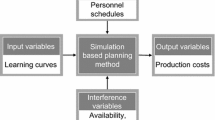Abstract
The production environment is in a constant state of change. This results in a continuous change of production processes. A key factor in mastering change is to increase flexibility. To achieve this, the targeted training of employees is essential. Within the framework of the research project “reQenrol”, research is being conducted to sustainably design personnel development based on the competence and tasks of the employees. Manufacturing companies face the challenge to efficiently training their personnel for an increasing and dynamic range of tasks. Training measures must be adapted to personal skill level of employees as well as to requirements of individual tasks in production. As a basis for a competence-based workforce deployment and the realization of targeted training measures, a survey was conducted on the current training situation and the relevance of competences in production. The results are placed into the context of the concept for an assistance system that enables manufacturing companies to perform a dynamic, competence-based workforce scheduling and realize targeted employee training.
Access this chapter
Tax calculation will be finalised at checkout
Purchases are for personal use only
Similar content being viewed by others
References
acatech (Hrsg.): Kompetenzen für Industrie 4.0. Qualifizierungsbedarfe und Lösungsansätze (acatech POSITION). Herbert Utz Verlag, München. https://www.acatech.de/wp-content/up-loads/2018/03/161202_POS_Kompetenz_Industrie40_Web.pdf (2016). Last accessed 12 Mar 2022
Bundesministerium für Wirtschaft und Klimaschutz (BMWi): Fachkräfte für Deutschland, https://www.bmwk.de/Redaktion/DE/Dossier/fachkraeftesicherung.html. Last accessed 04 May 2022
Boos, W.: Production Turnaround—Turning Data into Sustainability. Through the Internet of Production towards sustainable production and operation (2021)
Ast, J., Möhle, J., Bleckmann, M., Nyhuis, P.: Preliminary study in a learning factory on functional flexibility on workforce. In: 12th Conference on Learning Factories, CLF2022 (2022)
DIN EN ISO 9000:2015a: Qualitätsmanagementsysteme—Grundlagen und Begriffe (ISO 9000:2015)
Schmitt, R., Pfeifer, T.: Qualitätsmanagement. Strategien—Methoden—Techniken. 5th edn. Hanser, München, Wien, p. 49, 108 (2015)
DIN EN ISO 9001:2015b. Qualitätsmanagementsysteme—Anforderungen (ISO9001:2015)
Miller, T.: Empowerment konkret! Handlungsentwürfe und Reflexionen aus der psychosozialen Praxis. De Gruyter, Stuttgart (2016)
Kolb, M.: Personalmanagement. Grundlagen und Praxis des Human Resource Management. Gabler Verlag, Wiesbaden (2010). ISBN 978-3-8349-1853-6
Masing, W.: Fertigungsplanung und Fabrikeinrichtungen. Automatisierung der betrieblichen Qualitätssicherung. Zeitschrift für wirtschaftlichen Fabrikbetrieb. vol. 71, 7, p. 275 ff. (1976)
Geiger, W.: Qualitäts Lehre. Einführung, Systematik, Technologien. Springer Vieweg. Wiesbaden, p. 43 ff. (1994)
Weinert, F.E.: Definition and Selection of Competencies. Concepts of Competence. Max Planck Institute for Psychological Research, Munich, Germany (1999)
Lambert, B., Plank, R., Reid, D., Fleming, D.: A competency model for entry level business-to-business services salespeople. Serv. Mark. Q. 35(1), 84–103 (2014)
Erpenbeck, J., Rosernstiel, L., Grote, S., Sauter, W.: Handbuch Kompetenzmessung. Schäffler-Poeschel, Stuttgart (2017)
Thiele, P., Müller, W.: ESCO—Entwicklung einer europäischen Taxonomie für Berufe, Kompetenzen und Qualifikationen. BWP. vol. H4, p. 37 f. (2011)
Bughin, J., Hazan, E., Lund, S., Dahlström, P., Wiesinger, A., Subramaniam, A.: SKILL SHIFT. Automation and the future of the workforce. McKinsey&Company (2018)
The Future of Jobs Report. Centre of the New Economy and Society. World Economic Forum, Cologny, Genenva (2018)
Motz, M., et al.: Smarte Einsatzplanung und Schulung zur Qualitätssteigerung. Zeitschrift für wirtschaftlichen Fabrikbetrieb. 116(12), 945–950 (2021)
Pfeiffer, S.: Montage und Erfahrung. Warum ganzheitliche Produktionssysteme menschliches Arbeitsvermögen brauchen, 1st edn. Rainer Hampp Verlag, München (2007)
Völkl, K., Korb, C.: Deskriptive Statistik. Springer, Halle, p. 20 (2018)
Weiterbildung für die digitale Arbeitswelt. Eine repräsentative Untersuchung von Bitkom Research im Auftrag des VdTÜV e.V. und des Bitkom e.V. https://www.bitkom.org/sites/default/files/2018-12/20181221_VdTU%CC%88V_Bitkom_Weiterbildung_Studienbericht.pdf. Last accessed 8 Apr 2022
Senderek, R.: Lernen in der digitalisierten Arbeitswelt, pp. 195–203. Bde. Tagungsband Bigital Engineering zum Planen, Testen und Betreiben technischer Systeme (2015)
Abel, J., Wagner, S.: Industrie 4.0. Mitabeiterqualifizierung in KMU. wt Werkstattstechnik online. 107, vol. H. 3, pp. 134–140 (2017)
Acknowledgments
The CORNET project (No. 21842N) of the Federation of Quality Research and Science (FQS), August-Schanz-Straße 21A, 60433 Frankfurt am Main, Germany, was funded by the Federal Ministry for Economic Affairs and Climate Action through the German Federation of Industrial Research Associations (AiF) under the Industrial Collective Research (IGF) programme on the basis of a decision by the German Bundestag.
Author information
Authors and Affiliations
Corresponding author
Editor information
Editors and Affiliations
Rights and permissions
Copyright information
© 2023 The Author(s), under exclusive license to Springer Nature Switzerland AG
About this paper
Cite this paper
Möhle, J., Nörenberg, L., Shabanaj, F., Motz, M., Nyhuis, P., Schmitt, R. (2023). Sustainable Personnel Development Based on Production Plans. In: Liewald, M., Verl, A., Bauernhansl, T., Möhring, HC. (eds) Production at the Leading Edge of Technology. WGP 2022. Lecture Notes in Production Engineering. Springer, Cham. https://doi.org/10.1007/978-3-031-18318-8_67
Download citation
DOI: https://doi.org/10.1007/978-3-031-18318-8_67
Published:
Publisher Name: Springer, Cham
Print ISBN: 978-3-031-18317-1
Online ISBN: 978-3-031-18318-8
eBook Packages: EngineeringEngineering (R0)




